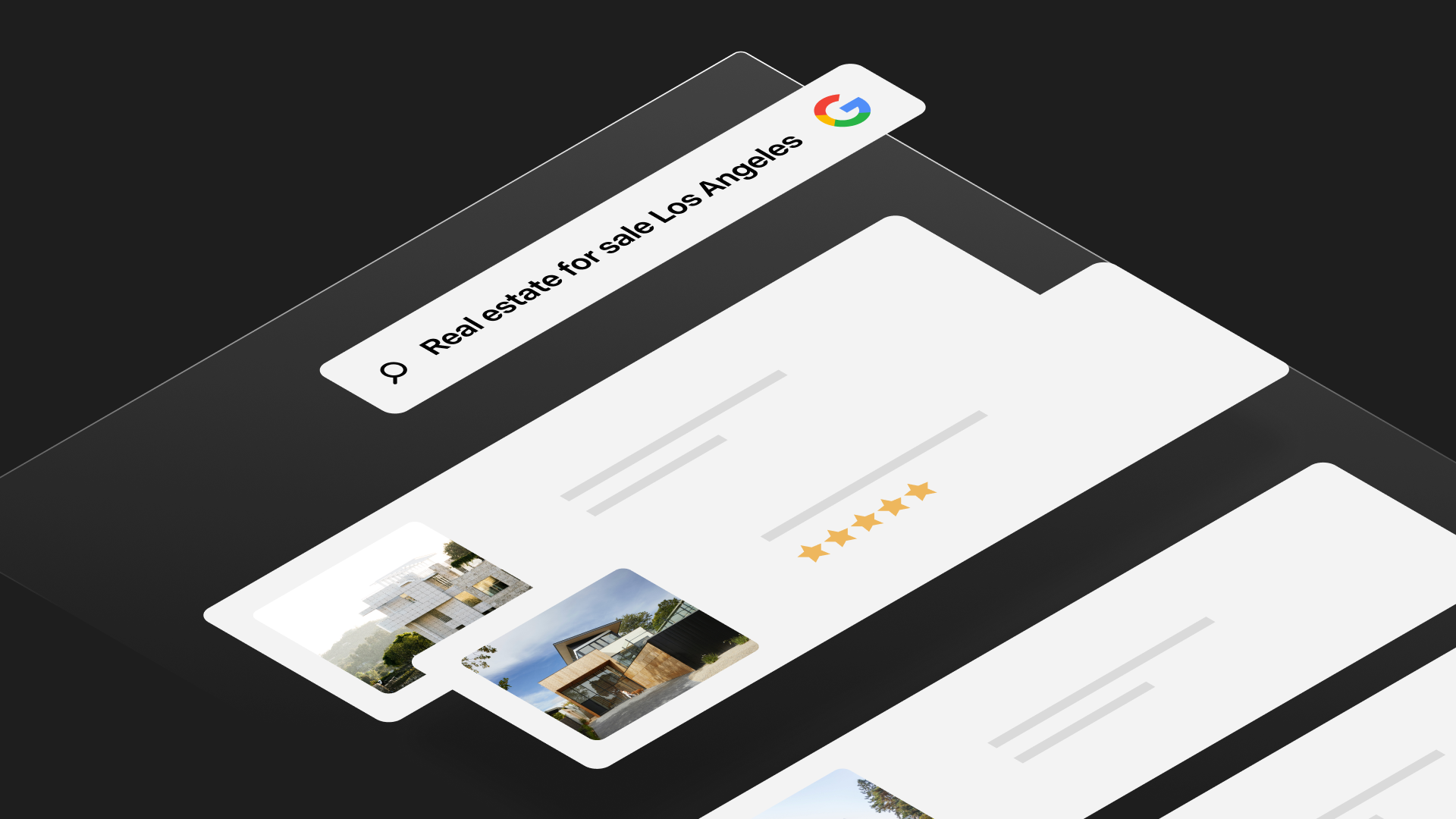For real estate agents aiming to elevate their online presence, it’s crucial to understand how to win the battle of the search engine results page. In this guide on how to outrank your competition on Google, we cover everything from understanding why rankings matter to uncovering Google’s complex ranking factors to implementing strategies to improve your rankings.
Find It Fast
Why rankings matter
Showing up at or near the top of search engine results pages means more eyeballs on your listings, enhancing trust and establishing your prominence in the local market. This is crucial in a competitive field like real estate, where being seen first can make all the difference in securing a client.
Google ranking factors explained
Pleasing Google isn’t just about adding keywords to your website. Google uses a complex algorithm that considers more than 100 factors, including quality of content, user experience, mobile-friendliness, and image optimization.
Optimizing these variables is key to outranking your competition on Google and boosting your visibility. Think of it as a holistic approach to digital marketing; every detail on your site contributes to climbing higher in search results.
If the thought of parsing more than 100 data points has your head spinning, we can help. Our expert SEO team has already helped hundreds of agents and brokers rank higher in search results, and they can do the same for you.
How to assess your rankings
The first step in this process is to assess your position. Here are some of the best tools for reviewing the SEO health of your real estate website.
Google search
The simplest method to check your real estate website rankings is to manually search Google. Simply enter a keyword that’s relevant to your offerings, find your website in the results, and compare it with competitors. Make sure to use an incognito or private browser window so your own online history doesn’t skew your results.
Keyword-tracking tools
Keyword tracking tools like Ahrefs, Semrush, and Moz monitor your website’s Google rankings, revealing performance for specific keywords, comparing your efforts to competitors, and uncovering keyword gaps where rivals rank but you don’t.
Google Analytics
Google Analytics is a free tool for tracking user interactions on your website, including visits, bounce rate, and time spent on page. Use it to compare performance with competitors. Note: Luxury Presence clients can access this data in their Presence dashboard, putting all the helpful insights in one place.
Google Search Console
Google Search Console is another great free tool. It provides data on your website’s performance in search, such as impressions, clicks, and click-through rates. You can also use it to compare your website’s performance with other sites in your niche to learn how to outrank your competition on Google.
Backlink analysis
Part of Google’s analysis of your website’s quality is how many other sites link back to it. Analyzing backlinks can show how you stack up to competitors and the quality of the sites that link back to you. Some useful tools for this include Ahrefs, Semrush, and Majestic.

How to outrank rank your competition on Google
We’ve outlined a comprehensive nine-part SEO strategy with active steps to outrank your competition on Google.
1. Research the competition
Based on our experience working in a top marketing agency, we recommend starting with detailed competitor research. Unless you understand your competition’s targeted keywords, content strategy, and website structure, climbing search rankings is tough.
Imagine finding out your competitor doesn’t rank well for certain keywords because their content doesn’t align with user intent. Their generic advice doesn’t accurately answer the audience’s questions. This content gap is your opportunity. You can then create content that delves deeply into topics, providing genuinely helpful information customized to audience needs.
2. Analyze search intent and keywords
Conducting keyword research and understanding what your audience wants is crucial. By identifying keywords aligning with your audience’s intent, you can tailor your website’s content to meet their needs.
Brainstorming prospect questions using tools like Google Keyword Planner and integrating them into your SEO strategy is an excellent first step. Use hyperlocal keywords targeting specific neighborhoods to get good search volume with less difficulty, which makes ranking easier.
3. Create a holistic SEO strategy
Now you can use the data you’ve gathered to create an SEO strategy. Track, adjust, and test SEO strategies for your real estate business. Remember, finding the right mix takes time, patience, and a willingness to try different things.
Also, align your SEO efforts with other digital marketing to create a strong online presence. Optimize web pages, refresh content regularly, enhance your site’s user experience, build backlinks, and create new high-quality content.
4. Use technical SEO best practices
Technical SEO is another crucial part of your SEO strategy, addressing the backend elements of your website to meet Google’s standards and improve your search ranking. Here are some practical examples that may help you outrank your competition on Google:
- Structured data: Implement schema.org markup to help search engines understand your content better and boost visibility in search results.
- Page speed: Enhance website loading speed to avoid ranking drops and improve user experience. Use tools like Google’s PageSpeed Insights for optimization.
- Mobile optimization: Having a mobile-friendly site should help you rank better due to Google’s mobile-first indexing.
- Duplicate content: Refrain from posting identical or very similar content to maintain clarity for search engines and rankings.
- Broken links: Regularly fix broken links to enhance user experience and SEO performance.
5. Go beyond just new content
A widely overlooked SEO strategy is not just generating new content but revisiting and refreshing your existing content to maintain its relevance and boost its ranking. By adding fresh images and video, including new details, and improving your structure and content, you can continue to improve over time and inch your way to the top of the search results page. Remember, there is no such thing as a piece of content that’s done. There is always more to improve.
6. Ensure your site is easy to use
Updating your website frequently with useful, high-quality content can significantly boost your visibility. Start by increasing the relevance of your internal links and fine-tuning anchor text to guide visitors effectively. Next, enrich your content with semantic keywords that align closely with your audience’s search intentions.
Finally, make your content easily digestible by breaking it into short paragraphs and using headings effectively. These simple yet impactful steps not only enhance user experience but also signal to Google that your site is a valuable resource deserving of a higher ranking. Remember, the goal is to create helpful content that is as informative as possible.
7. Upgrade your website’s user experience
Another crucial element is your website’s user experience (UX). Optimizing UX can significantly improve your ranking on Google, as a seamless, enjoyable user experience keeps visitors engaged longer and reduces bounce rates, signaling to Google that your site is valuable.
- Simplify design: Ensure your site is easy to navigate with a clean, uncluttered design. A user-friendly interface encourages visitors to stay longer.
- Conduct UX tests: Regularly visit your website from a user’s perspective to identify and rectify navigational challenges or design flaws.
- Monitor bounce rates and load times: High bounce rates can signal poor UX, negatively impacting your SEO rankings. Similarly, longer load times can deter visitors, so aim for a quick, responsive site.
8. Use local SEO strategies
Improve your visibility on local business pages, directories, and, particularly, Google My Business. These platforms are crucial points where potential buyers and sellers look for local expertise.
By regularly updating your listings with accurate information, asking satisfied clients for positive reviews, and interacting with local content, you build a strong online presence that can outrank your competition.
9. Get more quality backlinks
Backlinks from authoritative websites can help to boost Google rankings. To improve your backlinks, here are a few tips:
- Utilize tools like Ahrefs and Semrush to uncover your competitors’ backlinks and enhance your strategy.
- Disavow spammy, unhelpful, or irrelevant sites that are linking to you. Use Semrush to verify recent traffic and rankings. Avoid seeking links from sites with declining search performance.
- Contact potential partners via personalized emails showcasing the benefits of linking to your site. Tailor a page link to their audience. Leverage BuzzStream for efficient, competitive research and link-building outreach.
- When requesting a link, specify the anchor text, avoiding keyword duplication. Make sure the language is natural. Google can spot manipulation attempts; excessive exact match anchor text may result in penalties or lower rankings.
- Create a strategy for gaining backlinks through speaking engagements, appearing on panels, writing guest blogs, and being quoted in respected publications.
Outrank your competition with Luxury Presence
 Now that you understand how to outrank your competition on Google, you’re ready to take action. In a competitive market, assistance from experts versed in real estate industry specifics and updated SEO practices is key. Ready to enhance your Google presence and dominate your rivals? Our team is here to assist — book a demo today.
Now that you understand how to outrank your competition on Google, you’re ready to take action. In a competitive market, assistance from experts versed in real estate industry specifics and updated SEO practices is key. Ready to enhance your Google presence and dominate your rivals? Our team is here to assist — book a demo today.




